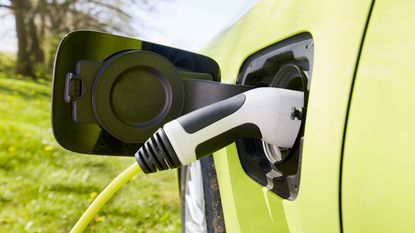EV Charger Tax Credit 2023: What You Need to Know
The federal EV charger tax credit for electric vehicle charging stations and equipment is back for 2023 with a few key changes.
- (opens in new tab)
- (opens in new tab)
- (opens in new tab)
- Newsletter sign up Newsletter


The EV charger tax credit is back, thanks to the Inflation Reduction Act (IRA) — massive climate, energy, tax, and healthcare legislation passed last year. You may have heard that the IRA contains billions of dollars in tax incentives including a tax credit for new and used electric vehicles. But the IRA also brought back the EV charger federal tax credit for electric vehicle charging stations and equipment that had expired two years ago.
There are some changes to the EV charger federal tax credit that you will want to be aware of so that you can potentially take advantage of the tax break. Here’s what you need to know.
2023 EV Charger Tax Credit: Is an Electric Car Charger Tax Dedutible?
The federal tax credit for electric vehicle chargers originally expired at the end of 2021. However, the Inflation Reduction Act’s Alternative Fuel Refueling Property tax credit extends the EV charger tax incentive for ten years — through December 31, 2032.

Sign up for Kiplinger’s Free E-Newsletters
Profit and prosper with the best of expert advice on investing, taxes, retirement, personal finance and more - straight to your e-mail.
Profit and prosper with the best of expert advice - straight to your e-mail.
So, what does that mean for you? Essentially, if you install a home EV charging station, the tax credit is 30% of the cost of hardware and installation, up to $1,000. Also, beginning this year (i.e., 2023), the EV charger tax credit for business and home installations applies to other EV charger equipment like bidirectional (i.e., two-way) chargers.
Businesses that install new EV chargers or EV charger equipment can also benefit from a tax incentive of up to 30% of the total cost of equipment and installation. But they will have to meet certain labor and construction requirements to be eligible to claim the full incentive.
Before the Inflation Reduction Act, the limit on the amount of the EV charger tax credit for businesses was $30,000. That limit applies to projects that were completed before the end of last year. However, under the IRA, if you complete the business installation project after 2022, the tax credit per property item is up to $100,000 per EV charger.
All of this means that while electric vehicle chargers are not entirely tax deductible, you might benefit, to some degree, from the tax incentives in the Inflation Reduction Act that apply for refueling property.
How to Claim the EV Charger Tax Credit: Form 8911
To claim the federal tax credit for your home EV charger, or other EV charging equipment, file Form 8911 with the IRS when you file your federal income tax return.
- You will need your receipts that show the purchase price of the EV charger and any fees for installation of the charger.
- You will also need to know your tax liability for the year that you’re claiming the credit. That’s because the EV charger tax credit is subtracted from any federal tax that you might owe on that year’s return.
Also, the EV charger tax credit isn’t refundable, so you won't receive cash back as a result of claiming the credit.
Biden’s EV Charging Station Plan
President Biden announced a $900 billion electric vehicle charging station investment plan. The plan is to build 100 million EV charging stations in thirty-five states. The Biden administration has indicated that the approved investment will span 53,000 miles of national highway.
The massive investment in EV charging stations stems from the Bipartisan Infrastructure Law that the White House says, “invests $7.5 billion to build a national EV charger network so that charging EVs is predictable, reliable, and accessible.”
Home Solar and Home EV Chargers
In a related addition to the EV charger tax credit, the Inflation Reduction Act provides incentives for installation of home solar panels with the Residential Clean Energy tax credit. For home and residential solar product installations, the IRA allows a nonrefundable tax credit of up to 30% of the total cost.
That 30% tax credit is based on eligible expenses like solar panels, power cells, labor, permitting and developer fees, other necessary related solar equipment, batteries, and inspection costs.
The solar energy tax credit applies for the next ten years — through December 2032. And the tax credit is available for the year in which you complete the solar installation.
The home solar panel tax credit can be beneficial on its own, of course. But it also has potential positive implications for people interested in using solar panels to charge their electric vehicles. That’s because if you’re eligible for both home and residential solar tax breaks and the tax credit for EV chargers and equipment, you could reap the benefits of two significant clean energy tax incentives in the new law.
And if you’re even luckier, you could be one of the consumers who is eligible next year to claim the EV tax credit for new and used electric vehicles.
EV Charger State Rebates and Incentives
In addition to the federal tax credit for EV chargers and EV charging equipment, there are numerous state and regional incentives that you may be able to benefit from if you have a home EV charging station.
For example, some utility providers in California offer both residential and commercial EV charger rebates. These California EV charger rebate amounts can be as high as $1,000 in some districts. New York offers an EV tax credit rebate that can also help offset the purchase and installation costs of an EV charging station. New York has offered a rebate of up to $5,000.
These are just a couple of examples of state EV charger incentives, but keep in mind that because the availability, amount, terms, and conditions surrounding state EV charger incentive programs vary considerably. So, it’s important to check your state to understand how the incentives work in your area.
Additionally, the U.S. Department of Energy has a searchable database on its website that can help you find state tax credits and rebates that might help offset or lower the cost of your EV charger and EV charging equipment.
More on Clean Energy Tax Credits in the Inflation Reduction Act
- Tax Credits in the Inflation Reduction Act: What You Should Know
- EV Tax Credit 2023: New Rules and Which Vehicles Are Eligible
- Tax Credits for Energy-Efficient Home Improvements

With more than 20 years of experience as a corporate attorney and business journalist, Kelley R. Taylor has contributed to numerous national print and digital magazines on key issues spanning education, law, health, finance, and tax. Over the years, Kelley has extensively covered major tax developments and changes including the "Trump" tax cuts (TCJA), pandemic-era changes in ARPA, the SECURE 2.0 Act, and the numerous clean energy tax credits in the Inflation Reduction Act. Kelley particularly enjoys translating complex information in ways that help empower people in their daily lives and work.
-
-
 Why You Should Teach Your Kids Investing
Why You Should Teach Your Kids InvestingPutting money in the stock market is one of the best ways to build wealth in America. That's why it is so important for parents to teach their kids investing.
By Kyle Woodley • Published
-
 10 Ways to Prepare Your Home for Summer Weather
10 Ways to Prepare Your Home for Summer WeatherHot summer weather can take a toll on your home if you're not prepared. Follow these tips to make sure you're ready for the season.
By Daniel Bortz • Published
-
 Half of Mothers Have Little or No Retirement Savings
Half of Mothers Have Little or No Retirement SavingsMother’s Day is just around the corner, but many moms face future financial insecurity because they have little or no retirement savings.
By Kelley R. Taylor • Published
-
 Having a Baby Could Soon Cost Less in These States
Having a Baby Could Soon Cost Less in These StatesHaving a baby is expensive, but these states are trying to make it less costly by eliminating the tax on diapers.
By Katelyn Washington • Published
-
 The Most Expensive States to Die In (Due to Death Taxes)
The Most Expensive States to Die In (Due to Death Taxes)You probably know the cost of living in your state, but what about the cost of dying — death taxes?
By Katelyn Washington • Published
-
 Is High-Yield Savings Account Interest Taxable?
Is High-Yield Savings Account Interest Taxable?Think a high-yield savings account is a good idea? Don’t forget that savings account interest is taxable.
By Katelyn Washington • Published
-
 2023 Georgia Tax Rebates Up to $500 Are Now Being Sent
2023 Georgia Tax Rebates Up to $500 Are Now Being SentGeorgia has started sending special 2023 surplus tax refunds to eligible residents.
By Kelley R. Taylor • Published
-
 Is Your Scholarship Tax-Free or Taxable?
Is Your Scholarship Tax-Free or Taxable?Scholarships are generally tax-free if certain IRS and other requirements are met.
By Kelley R. Taylor • Published
-
 Oklahoma Storm Victims Have an Extended IRS Tax Deadline
Oklahoma Storm Victims Have an Extended IRS Tax DeadlineOklahoma taxpayers impacted by severe April storms have an extended tax filing and tax payment deadline.
By Katelyn Washington • Published
-
 10 States With the Lowest Sales Tax
10 States With the Lowest Sales TaxDon't rush to a state with low sales tax if your goal is to save money.
By Katelyn Washington • Published









